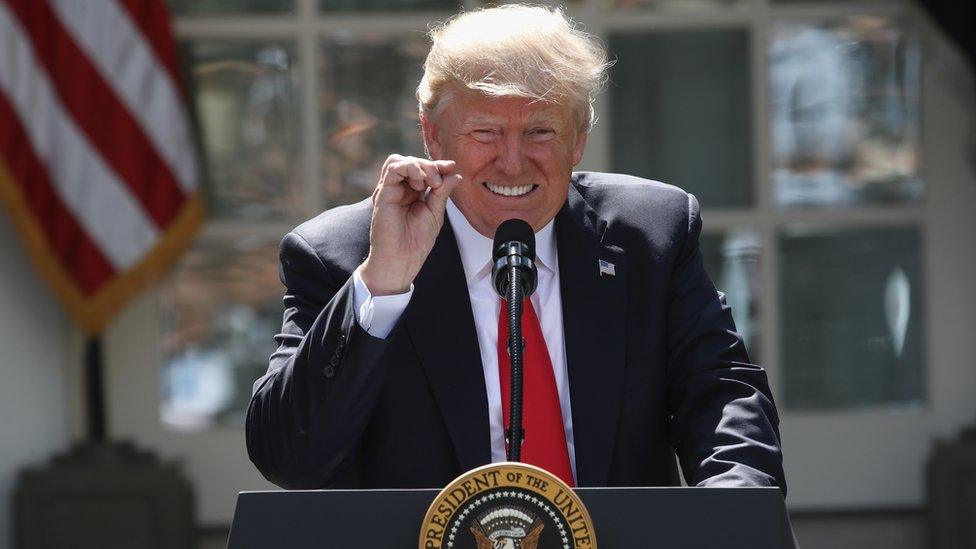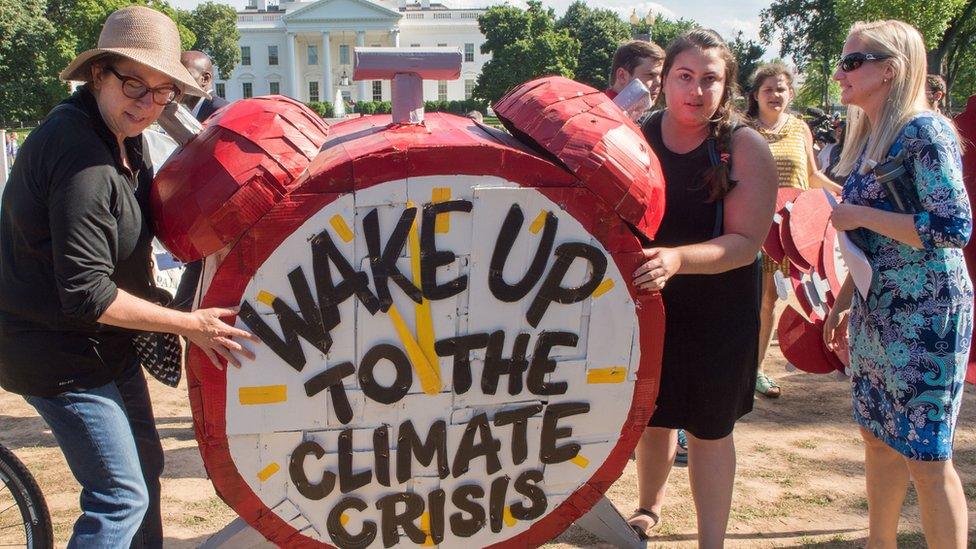Scientists dispute the 'tiny, tiny' impact of Paris deal
- Published

The President said that ultimately the Paris agreement would make little difference to temperatures
Climate scientists have taken issue with some of the research used by President Trump to bolster his case for withdrawal from the Paris agreement.
The President argued that even if the accord was fully implemented it would only have a "tiny, tiny" impact.
But researchers have told BBC News that the President was "cherry picking in the extreme" in his use of the facts.
They say that the Paris deal could make the difference between tolerable and dangerous levels of warming.
While much of his statement on withdrawal was concerned with the negative economic impact of being part of the Paris agreement, the President also mentioned the negligible impact that the deal would have on temperatures.
"It is estimated it would only produce a two-tenths of one degree … Celsius reduction in global temperature by the year 2100," he said during his lengthy explanation.
"Tiny, tiny amount."
Climate researchers have immediately taken issue with the President's use of the data.

Protesters outside the White House object to President Trump's withdrawal from the Paris climate agreement
"This is cherry picking in the extreme," said Prof Niklas Höhne, who works with the Climate Action Tracker , externalto monitor likely emissions levels.
"He picked the study that has the least impact of the Paris agreement on the global temperature increase."
The study on which this assertion was based, external was carried out by scientists at the Massachusetts Institute of Technology in 2014 and published in 2015.
Crucially the study didn't include all the commitments made by countries in the run up to the meeting in the French capital at the end of 2015 that agreed the wide-reaching Paris deal.
Another major question is that the study presumed that none of the actions proposed would continue past 2030.
"Their study assumes that countries implement their Paris pledges by 2030 but then move back to high emissions," said Prof Höhne.
"We think that is unrealistic because if the countries implement Paris they will likely continue with similar policies."
A subsequent investigation in 2016 by the same group at MIT suggests that up to one degree of warming could be averted if all the promises made in the Paris agreement were honoured. The authors believe that withdrawing from Paris is the wrong approach.
Their findings on how much difference Paris will make are echoed by the Climate Action Tracker researchers who found that 0.8 of a degree of warming could be avoided, external if countries stuck to their pledges. This difference could help prevent dangerous levels of warming for the whole planet.
"It is a considerable impact, and it is the first time since 2009 we see a considerable downward trend in temperatures because countries have made proposals for what they are going to do," said Prof Höhne.
"This, for me, is a really strong point of the Paris agreement."
How strongly the US pullout will impact future global temperatures is currently being assessed by scientists, including those at the World Meteorological Organisation (WMO).
"This is an additional 0.3 degrees on the warming, due to the withdrawal of the US," Deon Terblanche, the head of the WMO's Atmospheric Research and Environment Department, told a meeting in Geneva, stressing that this was an estimate and not a modelled result.
"That's a worst case scenario, and this is probably not what will happen."
Prof Niklas Höhne agrees that the full impact of the US pullout could be less than feared.
"President Trump wants to stop the Clean Power Plan, but it is very likely that some of the states will go even further and be more aggressive and we also hear there is pushback from many major companies that they want to go towards more renewables.
"In essence progressive states and companies could compensate for Trump."
Follow Matt on Twitter, external and on Facebook, external